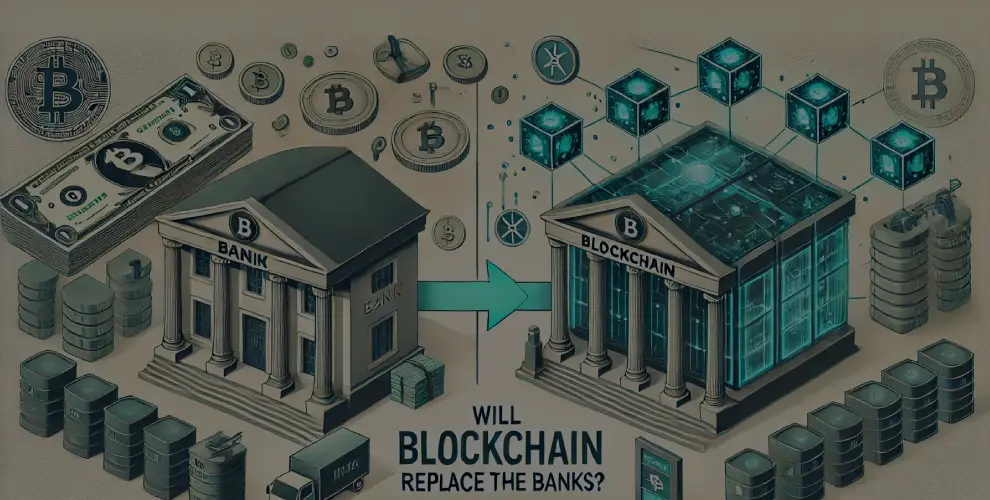
Will blockchain replace the banks?
Table of Contents
Introduction:
Welcome to WikiGlitz!
We’ve brought you this in-depth blog to explore the pressing question: Will blockchain replace the banks?
Blockchain technology has been a hot topic, especially in the finance world, where its potential to disrupt traditional banking is gaining momentum.
Let’s dive into how blockchain could change banking, its benefits, and whether it truly has the power to replace banks.
Key Takeaways:
- Blockchain could significantly disrupt the traditional banking system by offering faster, cheaper, and more secure transactions.
- While blockchain introduces innovative features, it may not entirely replace banks due to regulatory, security, and adoption challenges.
- Many banks are exploring blockchain technology to improve their services, indicating a trend toward collaboration rather than replacement.
Will Blockchain Replace the Banks?
The idea that blockchain could replace banks has stirred discussions among financial experts and technology enthusiasts.
While blockchain offers an innovative way to handle transactions, the reality is more complex.
Blockchain can potentially transform banking by introducing faster, more secure, and cost-effective methods of transferring assets.
However, replacing banks entirely is unlikely in the near future.
Banks play a crucial role in the global economy by providing services like loans, deposits, and financial advice, which involve complex regulatory compliance.
Blockchain, though powerful, is currently not equipped to manage these aspects fully.
In essence, blockchain vs traditional banking is not a zero-sum game.
Blockchain could significantly reshape the banking sector, but it may function more as a complementary tool rather than a direct replacement.
How Could Blockchain Disrupt the Banking Industry?
Blockchain’s ability to handle secure, decentralized, and tamper-proof transactions presents multiple ways it can disrupt the banking industry:
- Faster Transactions: Traditional banking transactions, especially cross-border payments, can take days. Blockchain enables instantaneous transactions, eliminating delays and reducing costs.
- Reduced Costs: Banks charge fees for services like money transfers. Blockchain reduces transaction fees dramatically by doing away with the need for middlemen.
- Enhanced Security: Blockchain technology provides a tamper-proof ledger, making it nearly impossible for fraudulent activities to occur. This level of security is unmatched in traditional banking systems.
Expert Insight:
A report by Deloitte suggests that blockchain could save banks an estimated $20 billion annually by streamlining cross-border transactions and improving data management.
However, it also points out that blockchain adoption requires overcoming challenges in regulation and system integration.
Can Blockchain Eliminate Banks?
In theory, blockchain could eliminate the need for banks by offering a decentralized, peer-to-peer network for managing assets. However, banks do much more than facilitate transactions.
They provide credit, investment services, regulatory compliance, and financial advice that blockchain alone cannot replicate.
Blockchain replacing traditional finance would require a paradigm shift in how people view and trust financial systems.
Banks also provide a layer of consumer protection and regulatory oversight that decentralized blockchain networks currently lack.
Why Complete Elimination Is Unlikely:
- Regulation: Financial systems are heavily regulated to protect consumers and maintain economic stability. Blockchain technology, while secure, still operates in a largely unregulated space.
- Trust: Banks have built trust over centuries as custodians of wealth. Blockchain would need to establish a similar level of trust on a global scale.
How Could Blockchain Change Banking?
Blockchain could revolutionize banking by improving efficiency, reducing costs, and enhancing security in several areas:
1. Cross-Border Payments:
Traditional international transactions go through multiple intermediaries, causing delays and high fees. Blockchain can streamline cross-border payments, providing real-time settlement at a fraction of the cost.
2. Smart Contracts:
Blockchain enables smart contracts, self-executing contracts with the terms of the agreement directly written into code. This feature could automate processes like loan issuance, saving time and reducing paperwork.
3. Identity Verification:
Banks require robust identity verification processes. Blockchain can store digital identities securely, simplifying the Know Your Customer (KYC) procedures while reducing fraud risks.
Will Banks Adopt Blockchain Technology?
Yes, many banks are already exploring and adopting blockchain technology to improve their services.
Major banks like JPMorgan Chase and HSBC are experimenting with blockchain for faster payments, secure data management, and fraud detection.
How Banks View Blockchain:
- Efficiency: Banks see blockchain as a tool to enhance transaction speeds and reduce operational costs.
- Security: The tamper-proof nature of blockchain is attractive to banks looking to safeguard customer data.
- Caution: Banks are cautious about the regulatory implications of blockchain, particularly concerning data privacy and anti-money laundering (AML) laws.
Does Blockchain Pose a Threat to Banks?
Blockchain does pose a competitive threat to banks by offering an alternative to traditional financial services.
Decentralized Finance (DeFi) platforms enable peer-to-peer lending, borrowing, and asset trading, which challenges the conventional banking model.
However, instead of directly threatening banks, blockchain is more likely to push them to innovate.
Banks are now actively investing in blockchain research and partnerships to integrate this technology into their operations.
Is Blockchain the Future of Banking?
Blockchain technology and banking are increasingly becoming intertwined. While blockchain alone may not completely replace banks, it is certainly shaping the future of banking. Many banks are leveraging blockchain to:
- Improve Transparency: Blockchain’s transparent ledger can enhance the accountability of financial transactions.
- Enhance Customer Experience: Instantaneous payments and automated smart contracts improve the efficiency of services offered by banks.
- Lower Costs: By reducing the reliance on intermediaries, banks can lower operational costs and pass those savings on to customers.
In short, blockchain will impact financial institutions by transforming how they operate, potentially leading to a hybrid system where traditional banking services are enhanced by blockchain capabilities.
How Will Blockchain Impact Financial Institutions?
Financial institutions will likely experience several changes as blockchain technology becomes more integrated:
- Back-End Operations: Blockchain can streamline back-end operations like settlements, reducing delays and costs.
- New Services: Banks could offer new services like digital asset management and blockchain-based identity verification.
- Competition: As blockchain-based platforms grow, traditional banks will need to innovate to stay relevant.
Conclusion
We hope this blog has provided clarity on the question, “Will blockchain replace banks?“ While blockchain has the potential to disrupt and revolutionize banking, a complete replacement of banks seems unlikely.
Banks play a multifaceted role that extends beyond simple transactions, and blockchain is poised to be a tool that enhances banking services rather than eliminating them.
As the financial world evolves, the collaboration between banks and blockchain technology seems more probable than a direct replacement.
Follow WikiGlitz for more such insights into the evolving world of technology and finance!
FAQs
Can blockchain replace banks entirely?
Not entirely. While blockchain can handle transactions efficiently, banks offer services like lending, investment management, and regulatory compliance, which blockchain alone cannot fully provide.
What banks think about blockchain?
Banks view blockchain as both an opportunity and a challenge. Many banks are investing in blockchain technology to enhance their services while remaining cautious about regulatory issues.
How does blockchain affect the banking system?
Blockchain can streamline transactions, enhance security, and reduce costs, impacting the traditional banking system by making it more efficient.
What is the role of blockchain in digital banking?
In digital banking, blockchain can facilitate secure transactions, smart contracts, and decentralized identity verification, improving customer experience and service efficiency.
Can blockchain eliminate banks’ fees?
Blockchain can significantly reduce transaction fees by eliminating intermediaries, but some fees may still exist for network maintenance and security.
Is blockchain only for banking?
No, blockchain has numerous applications beyond banking, including supply chain management, healthcare, real estate, and more.
Want to keep up with our blog?
Our most valuable tips right inside your inbox, once per month.
Error: Contact form not found.
WikiGlitz Team
Welcome to WikiGlitz, your ultimate destination for tech insights and innovation. Our expert team is dedicated to delivering free resources and professional advice on various technology topics, including Artificial Intelligence, Cyber Security, Cloud Computing, and more. We strive to empower our readers with up-to-date information and practical guidance, ensuring you stay ahead in the rapidly evolving tech landscape. At WikiGlitz, we are passionate about making complex technology accessible to everyone. Our team of seasoned experts curates content that is both informative and engaging, helping you understand and leverage the latest tech trends. Whether you're a tech enthusiast or a professional, WikiGlitz is your go-to source for reliable, expert-driven content. Join us on this journey to explore and embrace the future of technology.





